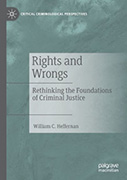Rights And Wrongs: Rethinking The Foundations Of Criminal Justice

Author: William C. Heffernan
Publisher: New York: Palgrave Macmillan. 2019. 149 p.
Reviewer: David Schultz | May 2021
The May 25, 2020 death of George Floyd at the hands of the police brought back to the attention of America the intersection of race and criminal justice. The George Floyd matter highlights the range of inequities concerning who is stopped, searched, arrested, convicted, and ultimately punished. What his death hopefully provokes is a rethinking of the many components that make up the American criminal justice system.
The aim of this book, actually published before Floyd’s death, is to reconstruct the American criminal justice punishment system, and in the process address the racial and class-based problems that plague it. It does that by walking the reader back in time, locating the origins of punishment in the concept of lex talionis — an eye for an eye. The beginning of the book traces the genesis of punishment as being a reciprocity between wrongs and their negative redress. It is a biblical concept. This view of punishment is not systematic, grounded in theory, or premised on ideas of deterrence. It is individualistic, personal, and immediate. Lex talionis is the basis of a theory of criminal justice, but it is not the same as the theory.
The criminal justice system, according to Heffernan, displays several traits. These includ a permanent enforcement agency in the hands of the state, a constitutional commitment to justice, a fair warning before punishment, and a societal or civic adherence to the fair and just use of punishment. The criminal justice system is more than a retaliation model premised on responding to injury with an equivalent injury. It needs to show culpability and proportionality, along with a sense of regularity and equity. At its best the criminal justice system is superior to lex talionis — producing a better, fairer, and more exact way to hold individuals accountable for their wrongs.
On the other hand, we are presented with the problem of how to control the criminal justice system when it goes astray? Controlling the state, especially its use of discretion in punishment, is a critical question for Heffernan. Whether to punish, what kind, and how much, are three basic questions that a criminal justice system must answer. In asking these three questions, Heffernan examines whether certain offenses should be decriminalized as alternative and better ways to control behavior. He also makes a case that in punishing, there is a responsibility to take care that prison conditions and the treatment of prison inmates are reasonable. Finally, he argues that any criminal justice system that fails to address racial and class disparities is problematic.
This is a brief book that highlights how and why a just punishment system is not simply a system of retaliation. The author does a good job in detailing the importance of the broader goals of a system to punish wrongs, and he also is very good in amplifying the important trustee role of the state in enforcing the law and punishing people. The contrast of lex talionis and criminal justice is meant to show how the US system has failed to move much beyond the former, especially in recent times, and, he argues, there is a need to take corrective action to improve it. Overall, there are some useful distinctions here that many readers will find informative.


